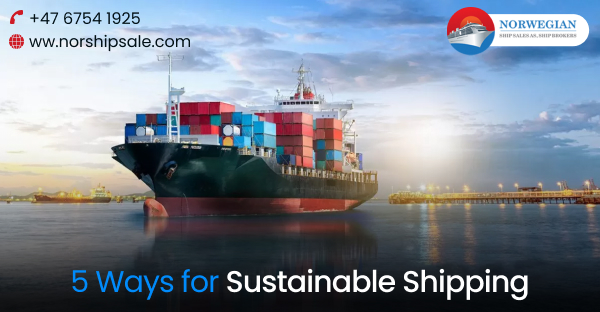Maritime shipping plays a key role in global trade and commerce. From the import and export of food grains to transporting industrial raw materials, ship vessels are crucial in maintaining healthy trade relations among countries. Passenger ferries for sale are also popular as a means of transport and leisure. But the flip side of all this is the increase in greenhouse gases generated by the fuel combustion of maritime vessels. Harmful gases like carbon dioxide, nitrous oxide, and sulfur oxide are released by the exhaust chambers of many ships. In this blog, we take a look at some sustainable ways that can help reduce the carbon emissions of the maritime sector.
1. Slow Steaming
Keeping in mind the environmental hazards created by carbon emissions, slow steaming is performed by the maritime sector to reduce climate impact considerably. Slow steaming implies reducing the maritime vessel’s travelling speed generally between 12 -19 knots. This helps to drastically bring down the fuel consumption of the vessel helping it to not only conserve fuel but also, to emit less CO2 and other toxic gases and save the environment.
2. More Use of LNG Fuel
More and more maritime vessels are using LNG or Liquefied natural gas for fuel when it comes to reducing environmental hazards. LNG is considered a greener alternative because it eliminates sulfur in the pre-liquefaction process, thus emitting less SOx that is Sulfur Oxides and also PM or Particulate Matter during the combustion process. It also emits considerably less NOx or Nitrogen Oxides and CO2 in comparison to other fuels available for usage.
3. Efficient Hull Design & Paint
For reducing carbon footprints caused by maritime vessels, the maritime industry is looking for advanced technologies for improvement in current hull coatings. Improved hull design and paint can reduce the frictional resistance which causes a maritime vessel to consume more power to maintain its speed and that signifies more fuel combustion and environmental pollution. Thus, today modern passenger ferries for sale are using efficient hull design and also paint to protect the environment from pollution.
4. Optimized Propulsion System
One of the best ways to reduce environmental impact by maritime vessels is by optimizing the propulsion system. An inefficient propulsion system can increase the fuel consumption level, which means more fuel combustion and more pollution. This can be controlled by using an efficiently designed propeller, like smart propulsion systems and hybrid propulsion systems, which leads to effective power saving. It is known through basic propeller theory that slow-rotating and high diameter propellers are beneficial for reducing fuel consumption, thus optimizing the ship propulsion system accordingly helps in controlling environmental pollution.
5. Low Carbon Fuels
To reduce carbon emissions, the maritime sector is quickly switching to environmentally friendly fuels like biofuels, green hydrogen and wind power etc. Major shipping companies have started using biofuel blends, which is expected to reduce carbon emissions by 15-20%. Similarly, maritime companies are also using green hydrogen to power their vessels, here renewable energy sources like wind power and solar power are used to split the water into oxygen and hydrogen that helps to power ship engines. Although usage of green hydrogen is still in its nascent phase, according to experts, it has great potential to create a 100% emission-free shipping industry. The maritime industry is also turning to wind power and trying to harness it for its potential to power maritime vessels and also for being one of the best options for reducing carbon emissions.
Conclusion
The maritime industry is trying to strictly bring down harmful emissions by experimenting with several sustainable options. If you are seriously considering maritime investment opportunities, go for modern and technologically advanced passenger ferries for sale and other vessels that are greener and environmentally friendly. Contact Norwegian Ship Sales for a professional consult of buying maritime vessels.


